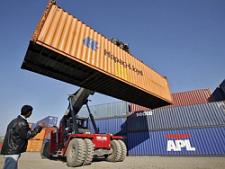The share of merchandise exports in the country's GDP has increased from 13.9 per cent in 2009-10 to 17.7 per cent in 2011-12, Parliament was informed on Wednesday.
 In a written reply to the Rajya Sabha, Minister of State for Commerce and Industry D Purandeswari said that exports have always played an important role in the economic development of most countries.
In a written reply to the Rajya Sabha, Minister of State for Commerce and Industry D Purandeswari said that exports have always played an important role in the economic development of most countries.
"This is evident even in Indian case from the continuous upward movement of percentage share of merchandise exports in the overall GDP of India from 13.9 per cent in 2009-10 to 16 per cent in 2010-11 and 17.7 per cent in 2011-12," she said.
She also said that as per the WTO trade statistics, India's share in the total global exports has also been increasing since 2007.
In 2007, 2008, 2009, 2010 and 2011, the country's share in the total global exports stood at 1.07 per cent, 1.21 per cent, 1.31 per cent, 1.48 per cent and 1.67 per cent respectively.
"The long term vision of the government
is to make India a major player in world trade and assume a role of leadership in international trade organisations commensurate with India's growing importance," the Minister said.
During April-January period, overseas shipments declined by 4.86 per cent to $239.6 billion.
In a separate reply, Purandeswari said that negotiations for a free trade agreement between India and with Gulf Cooperation Council (GCC) have been at a standstill since 2008.
The GCC countries are Bahrain, Kuwait, Oman, Qatar, Saudi Arabia, United Arab Emirates.
The mandate for the negotiations for a FTA was given by the Trade Economic Relations Committee (TERC) in July 2005 after which two rounds of negotiations were held in 2006 and 2008.
"We have been informed that GCC is reviewing its negotiations with all countries and economic groups, and that a study has been commissioned by them to examine the issue of negotiations with India and China," she said.
© Copyright 2025 PTI. All rights reserved. Republication or redistribution of PTI content, including by framing or similar means, is expressly prohibited without the prior written consent.

 In a written reply to the Rajya Sabha, Minister of State for Commerce and Industry D Purandeswari said that exports have always played an important role in the economic development of most countries.
In a written reply to the Rajya Sabha, Minister of State for Commerce and Industry D Purandeswari said that exports have always played an important role in the economic development of most countries.